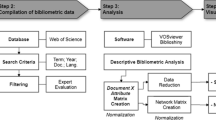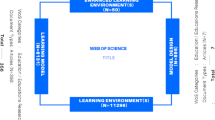Abstract
In the current global world, and also due to the CoVID-19 pandemic and the evolving digital technologies, education is changing faster and more dramatically now than at any time in history. In this context, education is drifting away from the traditional approaches and into the integration of international, intercultural and global dimensions in higher education, vocational education and training, as well as in secondary education. Thus, the purpose of this exploratory study is to unveil current trends and future needs of research and practice focused on Collaborative Online International Learning (COIL), to set conceptual foundations for further pedagogical innovation. Following the PRISMA 2020 statement, the corpus of the study integrates a final set of research studies (n = 135), published between 2019–2022. Considering the main key-terms of recent literature in the area, the collected data were analyzed by means of a bibliometric analysis, using VOSviewer’s network and overlay visualization of most frequent terms.
Access this chapter
Tax calculation will be finalised at checkout
Purchases are for personal use only
Similar content being viewed by others
Notes
References
Mittelmeier, J., Rienties, B., Gunter, A.W., Raghuram, P.: Conceptualizing internationalization at a distance: a “third category” of university internationalization. J. Stud. Int. Educ. 25, 266–282 (2020)
Kaleja, K., Egetenmeyer, R.: Internationalization in european vocational education and training. In: Tran, L.T., Dempsey, K. (eds.) Internationalization in Vocational Education and Training. TVETICP, vol. 25, pp. 63–76. Springer, Cham (2017). https://doi.org/10.1007/978-3-319-47859-3_4
de Wit, H., Altbach, P.: Internationalization in higher education: global trends and recommendations for its future. Policy Rev. High. Educ. 5(1), 28–46 (2021). https://doi.org/10.1080/23322969.2020.1820898
Beelen, J., Jones, E.: Europe calling: a new definition for internationalization at home. Int. High. Educ. 83, 12–13 (2015)
Leask, B.: Internationalizing the Curriculum. Routledge, Abingdon (2015)
Leask, B.: Internationalizing curriculum and learning for all students. In: Jones, E., Coelen, R., Beelen, J., Wit, H. (eds.) Global and Local Internationalization. TCSE, pp. 49–53. SensePublishers, Rotterdam (2016). https://doi.org/10.1007/978-94-6300-301-8_8
Leask, B., Gree, W.: Is the Pandemic a Watershed for Internationalization. University World News (2020)
van’t Land, H., Corcoran, A., Iancu, D.-C. (eds.): The Promise of Higher Education. Springer, Cham (2021). https://doi.org/10.1007/978-3-030-67245-4
de Wit, H.: COIL—Virtual Mobility Without Commercialisation. University World News (2013)
Alvarez, L., Steiner, M.: Collaboration online international learning. from a systematic review of literature about barriers to an implementation plan. In: Shifferings, M., Weissenbach, S., Knops, N. (eds.) ASEM Education in a Digital World. Bridging the Continents—Connecting the People, pp. 18–29. Erasmus+ National Agency for EU Higher Education Cooperation: Bonn, Germany (2019)
Ward, H.: Internationalization in Action (special ed.) – Connecting Classrooms: Using Online Technology to Deliver Global Learning, American Council on Education, Washington (2016)
Ziegler, B.E.: Methods for bibliometric analysis of research: Renewable energy case study. Doctoral dissertation, Massachusetts Institute of Technology (2009). http://hdl.handle.net/1721.1/61289
Ellegaard, O., Wallin, J.A.: The bibliometric analysis of scholarly production: how great is the impact? Scientometrics 105(3), 1809–1831 (2015). https://doi.org/10.1007/s11192-015-1645-z
Zhang, L., Carter, R.A., Jr., Qian, X., Yang, S., Rujimora, J., Wen, S.: Academia’s responses to crisis: a bibliometric analysis of literature on online learning in higher education during COVID-19. Br. J. Edu. Technol. 53, 620–646 (2022). https://doi.org/10.1111/bjet.13191
Liberati, A., et al.: The PRISMA statement for reporting systematic reviews and meta-analyses of studies that evaluate healthcare interventions: explanation and elaboration. BMJ 339, b2700 (2009). https://doi.org/10.1136/bmj.b270
Zupic, I., Čater, T.: Bibliometric methods in management and organization. Organ. Res. Methods 18, 429–472 (2015). https://doi.org/10.1177/1094428114
Author information
Authors and Affiliations
Corresponding author
Editor information
Editors and Affiliations
Rights and permissions
Copyright information
© 2022 The Author(s), under exclusive license to Springer Nature Switzerland AG
About this paper
Cite this paper
Balula, A. (2022). Drifts of Collaborative Online International Learning (COIL) Towards Pedagogical Innovation: A Foretelling Bibliometric Analysis. In: Reis, A., Barroso, J., Martins, P., Jimoyiannis, A., Huang, R.YM., Henriques, R. (eds) Technology and Innovation in Learning, Teaching and Education. TECH-EDU 2022. Communications in Computer and Information Science, vol 1720. Springer, Cham. https://doi.org/10.1007/978-3-031-22918-3_32
Download citation
DOI: https://doi.org/10.1007/978-3-031-22918-3_32
Published:
Publisher Name: Springer, Cham
Print ISBN: 978-3-031-22917-6
Online ISBN: 978-3-031-22918-3
eBook Packages: Computer ScienceComputer Science (R0)




